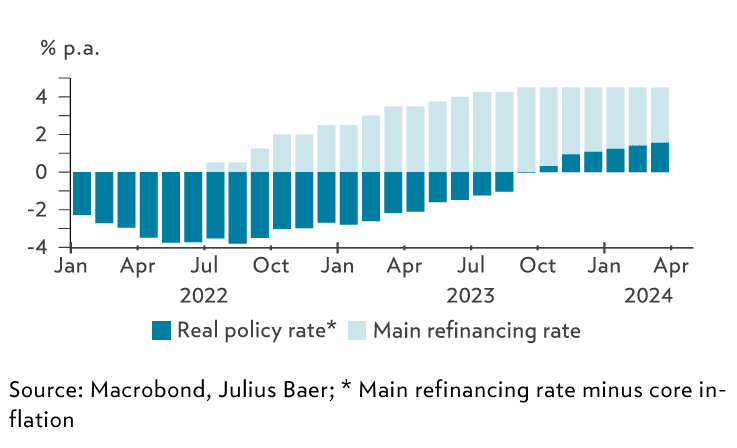ECB Should Have Already Cut Rates, Say These European Investment Banks
- Written by: Gary Howes

Image © Adobe Stock
The European Central Bank (ECB) has no business keeping interest rates at currently restrictive levels warn economists at two European investment banks, with one saying we could be surprised by a cut on Thursday.
"We take the view that interest rates are currently deeply in restrictive territory," says Nick Kounis, an economist at ABN AMRO. "The eurozone economy has been stagnating for more than a year."
The call comes ahead of the ECB's April policy decision, due Thursday, where interest rates will be kept unchanged.
The ECB is expected to lay out guidance that it will cut rates for the first time in June and say that any further rate cuts will depend on incoming data, a message that should prevent the market from aggressively raising bets for further rate cuts.
"There are very few convincing reasons why the European Central Bank could not cut interest rates immediately, as lower inflation continues to drive real rates higher," says David Kohl, an analyst at Julius Baer.
Above: Real interest rates at the ECB are outright restrictive. Image: Julius Baer.
The low-volatility environment weighing on global exchange rate markets reflects a suspicion that the ECB and other developed market central banks intend to mirror the Federal Reserve when it comes to cutting interest rates, hoping to avoid any potential negative currency impacts first movers can tend to experience.
One only needs to look at the rapid selloff in the Franc following the Swiss National Bank's surprise decision to cut rates in March to show the risk policy divergence can bring.
But Kohl says the ECB's reticent stance is unwarranted as the U.S. economy is proving much stronger than the Eurozone's.
"The US Federal Reserve has much less urgency to cut rates given the strong growth backdrop, making monetary policy interdependence between the two central banks unlikely," he explains.
ABN AMRO says the only justification for restrictive monetary policy has been above-target inflation. "However, the inflation picture is changing fast. Even assuming 125bp of rate cuts in the second half of this year, monetary policy would still be restrictive at the end of 2024."
Kohl says there are "very few convincing reasons" why the ECB could not cut rates as early as at this week’s ECB meeting and that any delay to June serves as confirmation that the central bank is pursuing a 'Fed-dependent' monetary strategy that comes at the expense of a 'data-dependent' policy.
Julius Baer says falling inflation and a flat central bank policy rate means real rates in the Eurozone have risen from 0% in September 2023 (when it last raised rates) to 1.6% in March.
"We see a good chance that the ECB will surprise with a rate cut this week," says Kohl. For the Euro, a surprise rate cut this week would trigger significant weakness.
Economists at ABN AMRO say the ECB will cut in June, and that the real question for markets is what happens beyond.
"A lot of the attention is now actually about the path beyond June. Investors are basically 50-50 on whether a June cut will be followed by a July move and market pricing suggest that the ECB will pause at least at one meeting after the cycle begins," says Kounis.
"Our own base case is that the ECB will cut policy rates at each and every meeting from June onwards," he says. This would mean the market would need to lower its interest rate expectations, which we would expect to weigh on Euro exchange rates, all else equal.




